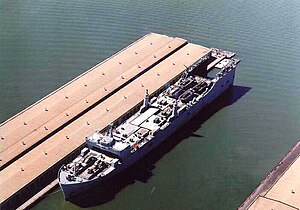SS Cape Mohican (T-AKR-5065)

| |
| History | |
|---|---|
| Name | SS Cape Mohican (T-AKR-5065) |
| Builder | General Dynamics Shipyard, Quincy MA |
| Laid down | 15 July 1971 |
| Launched | 23 September 1972 |
| Acquired | 20 March 1986 |
| Identification |
|
| Status | Ready reserve fleet |
| General characteristics | |
| Displacement | 57,290 long tons |
| Length | 873 ft (266 m) |
| Beam | 105 ft (32 m) |
| Draft | 39 ft (12 m) |
| Propulsion | two steam turbines, one shaft |
| Speed | 16.2 knots (30 km/h) |
| Complement | 34 (9 at reduced operational status) |
| Armament | none |
The SS Cape Mohican (T-AKR-5065) is a steam turbine powered heavy-lift SEABEE barge carrier, one of two ships of her type in the Military Sealift Command's Ready Reserve Force.
She was originally built as the Maritime Administration type (C8-S-82a) hull SS Tillie Lykes, ON 536672, IMO 7223314, under MARAD contract (MA hull 243), for commercial use with the Lykes Brothers Steamship Company. She was laid down on 15 July 1971 at the General Dynamics Shipyard in Quincy, Massachusetts, hull no. 20. She was launched on 23 September 1972, and delivered for service on 16 March 1973. The ship was turned over to MARAD on 20 March 1986, and assigned to MSC's RRF as SS Cape Mohican (T-AKR-5065).
Cape Mohican was activated for service during Desert Storm, and has performed various transportation duties over the years. She is berthed at Port of Oakland, California as part of the National Defense Reserve Fleet (NDRF). Regular maintenance and sea trials keep her ready to activate on five days' notice.
The Cape Mohican was the source of a 1996 spill of 40,000 gallons of heavy fuel oil in San Francisco Bay causing $3.625 million in natural resources damages.[1][2]
Grounding
On May 21, 2001, the SS Cape Mohican (T-AKR 5065) was participating in an exercise at Chilpo Beach, just north of Pohang, South Korea. While in the harbor, heavy winds caused her to drag anchor approximately 150 feet and run aground on rocks, causing damage to her hull and internal tanks. This damage required salvage work and emergency dry-docking along with 1500 tons of steel to make her seaworthy again [3]
See also
- SS Cape May (T-AKR-5063) sister ship
References
- ^ Notice of Lodging of Consent Decree in an Oil Spill Case | Federal Register Environmental Documents | USEPA
- ^ California Department of Fish & Game
- ^ American Society of Naval Engineers, 2004
 This article includes information collected from the Naval Vessel Register, which, as a U.S. government publication, is in the public domain. The entry can be found here.
This article includes information collected from the Naval Vessel Register, which, as a U.S. government publication, is in the public domain. The entry can be found here.- Factsheet on the website of the MSC
- NavSource Online Service Ship Photo Archive: Mohican
- Maritime Administration Record Detail: Mohican
